Publications
For submission of articles or Working Papers to CEsA, please send an email to:
comunicacao@cesa.iseg.ulisboa.pt
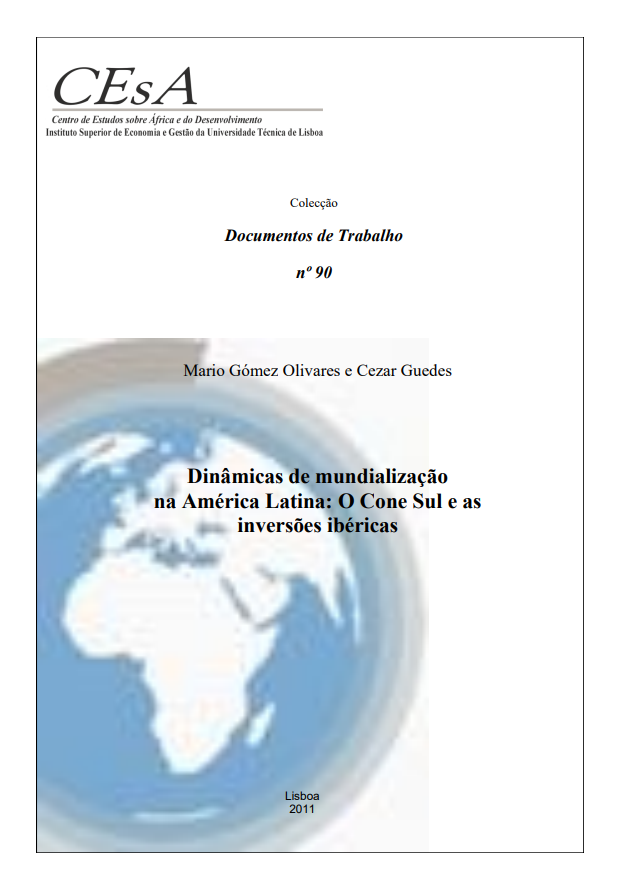
Working Paper 90/2011: Dinâmicas de mundialização na América Latina: o Cone Sul e as inversões ibéricas
Abstract:
Dinâmicas de mundialização na América Latina: o Cone Sul e as inversões ibéricas has the objective of analyzing in perspective the integration processes that Latin America has gone through, particularly the Southern Cone, in the long process of formation of the world economy since the expansion that incorporated the American continent to the capitalist development until the beginning of the XXI century. The emphasis is placed on the eighties of the last century, when another form of integration began, marked by commercial and financial openness, as well as by a growing integration of markets accompanied by the formation of economic blocs at global and regional level. The spatial logics and relations of the Southern Cone as a destination for foreign direct investment (FDI) originating in Spain and Portugal will be discussed in greater detail. This is an aspect that we highlight: from the point of view of the impact of investments, the Southern Cone is seen as an Iberian reality rather than a European or exclusively American one, as it was until the early 1990s. In other words, we underline the particularity of the Iberian option for a selective strategy of internationalization of its companies, leaving the traditional logic behind when moving towards a peripheral space outside the circuits of the Triad (USA, Japan and the European Union); on the contrary, and differently from the other European countries, enabling a path of integration which is what results from the internationalization of companies and the economy in the global space.
Quotation:
Gómez Olivares, Mario e Cezar Guedes. 2011. “Dinâmicas de mundialização na América Latina: o Cone Sul e as inversões ibéricas”. Instituto Superior de Economia e Gestão .CEsA – Documentos de Trabalho nº 90/2011
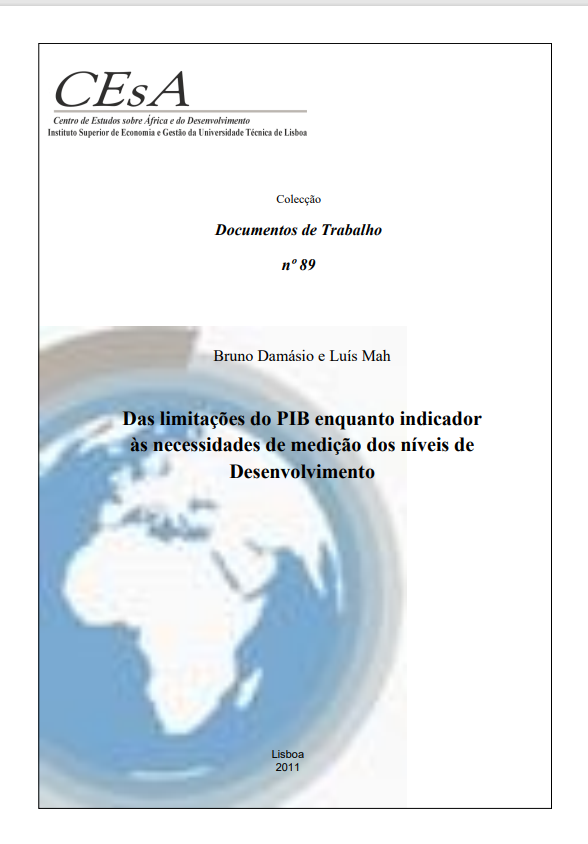
Working Paper 89/2011: Das limitações do PIB enquanto indicador às necessidades de medição dos níveis de desenvolvimento
Abstract:
Das limitações do PIB enquanto indicador às necessidades de medição dos níveis de desenvolvimento seeks to problematise some limitations and shortcomings of the traditional tools for measuring the economic performance and development of States, such as the Gross Domestic Product (GDP). The need to consolidate and stimulate the improvement of alternative indicators and measures is stressed, so as to reduce the existing deficiencies in the current measurements of development that serve as reference. Using the valid definition of economy as the allocation of scarce resources to unlimited needs, we arrive at a concept of economic policy as the action of public authorities in economic domains aimed at obtaining previously chosen results (Amaral, 1996). It is interesting, then, to reflect on the fact that, without the construction of statistical instruments and indicators that allow us to assess the consequences and interpret the results deriving from political action, it will be difficult to provide consistent guidance for economic policy-making. It is in this context that we start our essay with a meditation on the possible weakness of the economic activity indicator most used by mainstream economists and politicians.
Quotation:
Damásio, Bruno e Luís Mah. 2011. “Das limitações do PIB enquanto indicador às necessidades de medição dos níveis de desenvolvimento”. Instituto Superior de Economia e Gestão. CEsA – Documentos de Trabalho nº 89/2011.
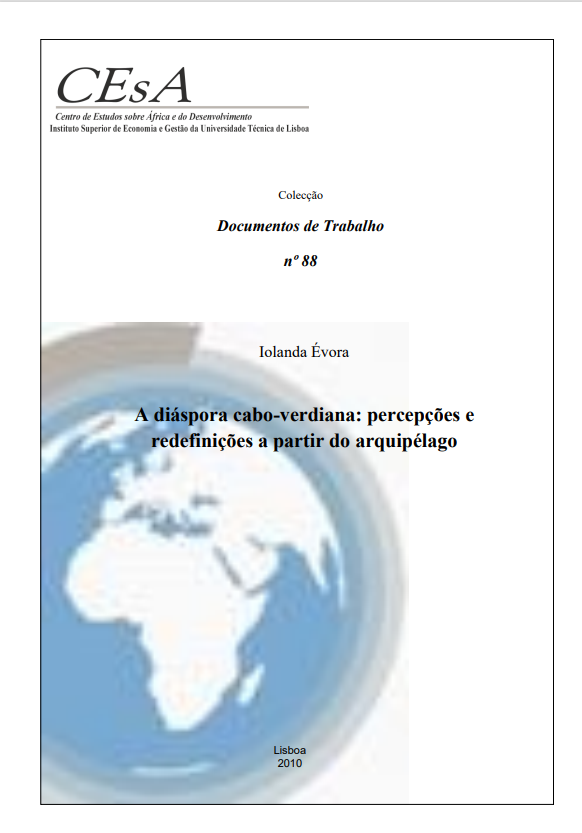
Working Paper 88/2010: A diáspora cabo-verdiana: percepções e redefinições a partir do arquipélago
Abstract:
Using the valid definition of economics as the allocation of scarce resources to unlimited needs, we arrive at a conception of economic policy as the action of public authorities in economic domains aimed at obtaining previously chosen results (Amaral, 1996). (Amaral, 1996). It is interesting, then, to reflect on the fact that, without the construction of statistical instruments and indicators that allow us to assess the consequences and interpret the results deriving from political action, it will be difficult to provide consistent guidance for economic policy-making. It is in this context that we begin our essay with a meditation on the possible weakness of the economic activity indicator most used by mainstream economists and politicians. A diáspora cabo-verdiana: percepções e redefinições a partir do arquipélago seeks to problematise some limitations and insufficiencies of the traditional tools for measuring the economic performance and development of states, such as the Gross Domestic Product (GDP). The need to consolidate and stimulate the improvement of alternative indicators and measures is highlighted, so as to reduce the existing deficiencies in the current measurements of development that serve as reference.
Quotation:
Évora, Iolanda. 2010. “A diáspora cabo-verdiana: percepções e redefinições a partir do arquipélago”. Instituto Superior de Economia e Gestão – CEsA – Documentos de trabalho nº 88/2010.
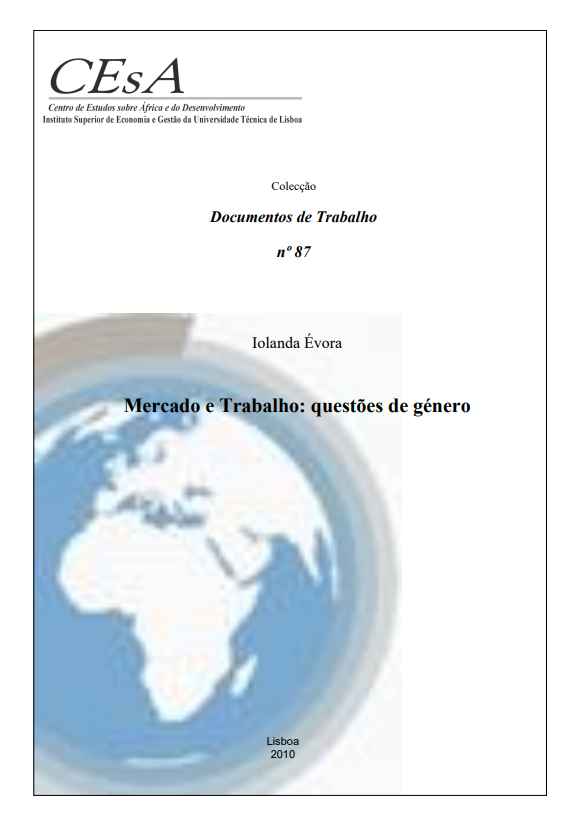
Working Paper 87/2010: Mercado e trabalho: questões de género
Abstract:
Mercado e trabalho: questões de género is based on reflections raised in observations made at fairs and markets in Cape Verde and Guinea-Bissau, within the scope of the Exploratory Visit project entitled “Free fairs and markets in the Portuguese-speaking space: work, sociability and income generation”. In this project, researchers from Brazil (Professor Leny Sato), Cape Verde and Guinea-Bissau, visited fairs and markets in the 3 countries and aimed to learn about important aspects of the daily dynamics of these organizational actions, of the processes that organize the work there. and some life trajectories of workers and agents who build micro-enterprises in these organizational contexts. The reflections that I bring here focus, above all, on situations observed in Cape Verde and Guinea-Bissau, because in these two countries the division of labor based on the gender category became much more visible, while the São Paulo fair shows much more work as a family occupation. The demand for development, autonomy and equality of opportunity in newly independent countries such as Cape Verde and Guinea-Bissau is introduced at the heart of the inter-human relationship and the dynamics of equality ended up being introduced in a domain that had been hidden for a long time: the relationships between men and women. In these countries, in the period of socialism and currently – which many call post-socialist -, with the new project of society, we seek to demonstrate the equivalence between the sexes in an unequivocal way in the public, intellectual and social domain, with more favorable laws. to the legal status of working women, and at the same time, investment is made in the professional field of women. The political changes in these two countries go beyond changes in relation to access to employment and encompass the construction of new meanings for work and family activities, as well as changes in the feminine sense of women’s place in society. In other words, in the new political contexts, we are witnessing the drawing of new boundaries between the spheres of work and the family, but it is important to point out that changes in the relationships between work and family have different consequences for men and women in real life.
Quotation:
Évora, Iolanda. 2010. “Mercado e trabalho: questões de género”. Instituto Superior de Economia e Gestão. CEsA – Documentos de Trabalho nº 87/2010.
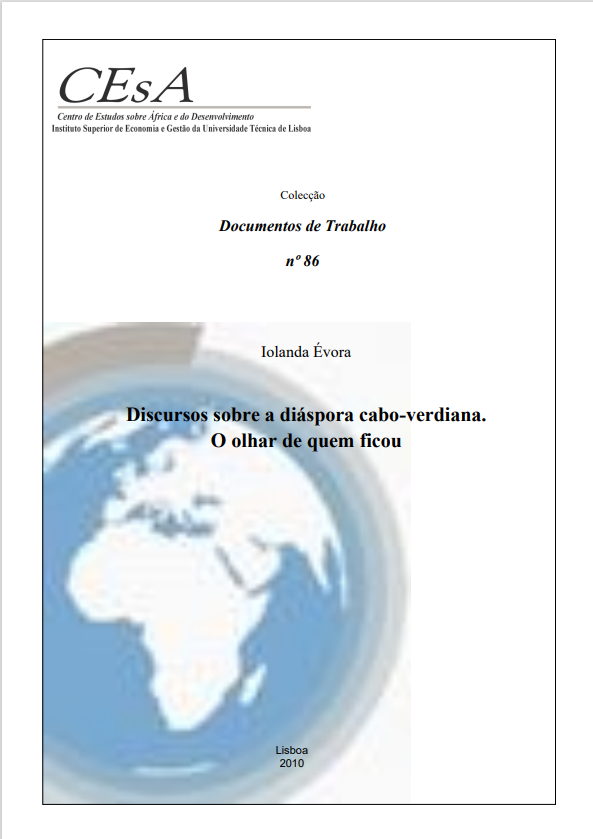
Working Paper 86/2010: Discursos sobre a diáspora cabo-verdiana: o olhar de quem ficou
Abstract:
The interest in the subject of Discursos sobre a diáspora cabo-verdiana: o olhar de quem ficou is included in our broader proposal of studies on Cape Verdean migration and, more specifically, within this field, with the intention of deepening knowledge about the position of different groups or social segments in relation to Cape Verdean migration. Verde, inside and outside the country. The idea is to underline that the field of Cape Verdean migration is very complex, which proves to be conducive to the reproduction of social and class divisions that are born in the archipelago, and therefore cannot be approached as if all Cape Verdeans were on it. and descendants had the same perspective and expectation. In this sense, the generalist conceptions about Cape Verdean migration must be understood as a result of disputes between groups to impose their conceptions on migration. In relation to Cape Verde, the emphasis has always been on the formation of a specifically diasporic identity by which, in an apparently paradoxical way, the cement would be constituted by spatial dispersion and the common reference to an almost mythical origin of a stepmother-land. In an imaginary way, they made the diasporic Cape Verdean identity positive, but in the name of the adverse conditions at the origin, that initial evil, they attributed exceptional gifts to this dispersed people arising from an ungrateful destiny.
Quotation:
Évora, Iolanda. 2010. “Discursos sobre a diáspora cabo-verdiana: o olhar de quem ficou”. Instituto Superior de Economia e Gestão. CEsA – Documentos de Trabalho nº 86/2010.
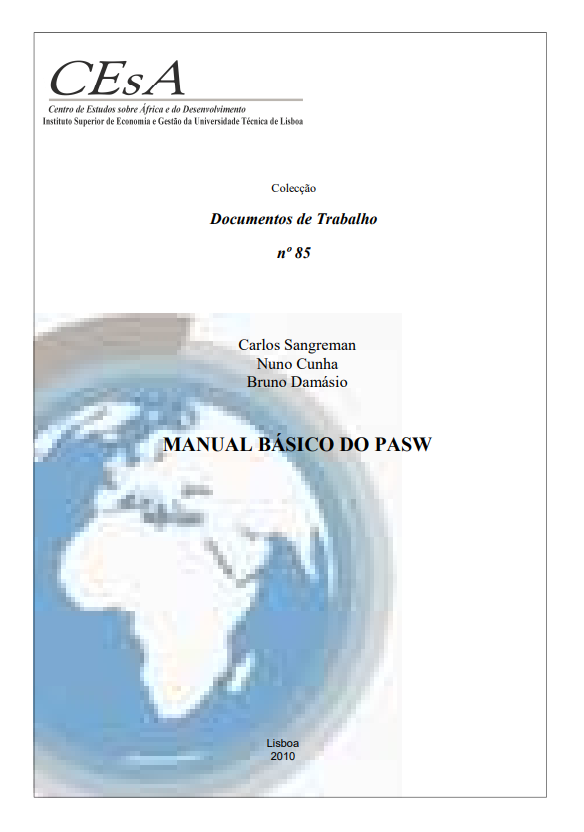
Working Paper 85/2010: Manual básico do PASW
Abstract:
The text of this Manual básico do PASW started to be constructed for a training course in Guinea Bissau in 1999, as part of the project “Welfare Observatory in a suburban district of Bissau” financed by the Ministry of Labour and Solidarity (now Ministry of Labour and Social Security) and implemented by the Guinean NGO Association for Development (AD). It is intended to explain a quick and efficient way to use PASW Statistics 18 (ex-SPSS) in data management and analysis. That is, the way in which the data approach can be carried out in the field of social sciences using descriptive statistics. The best way to circumvent several intrinsic vicissitudes in the process of creating a database in the program in question is highlighted. Not only is the introduction of elementary statistical concepts worthy of note, as well as their application within the scope of procedures inherent to the treatment of information collected in the context of a survey. This Manual is an evolving work that was expressly constructed to teach statistical data collection in Africa to people with that kind of work and with very practical concerns, so that these technicians have their capacities extended in a sustained manner, without increasing their dependence on the outside.
Quotation:
Sangreman, Carlos . Nuno Cunha e Bruno Damásio. 2010. “Manual básico do PASW”. Instituto Superior de Economia e Gestão. CEsA – Documentos de Trabalho nº 85/2010.
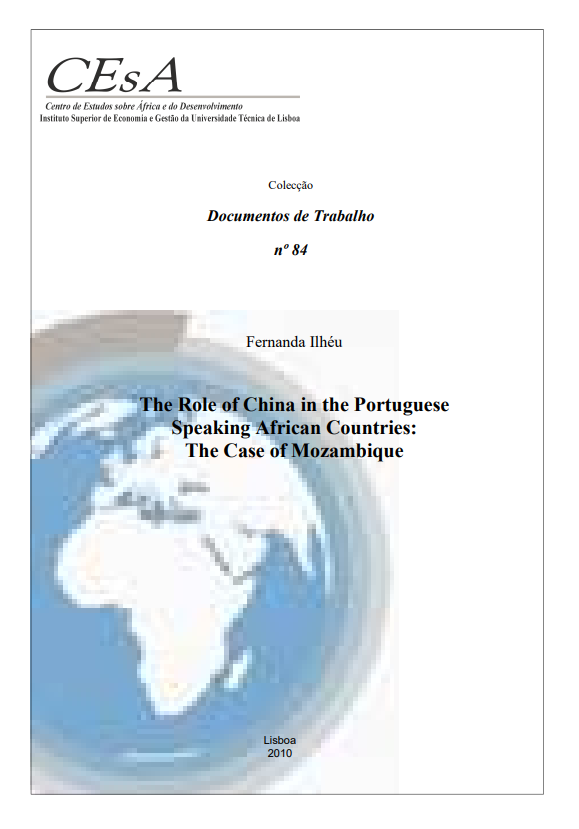
Working Paper 84/2010: The role of China in the portuguese speaking african countries: The case of Mozambique
Abstract:
Due to the Reform and Open Door Policies initiated in 1978, China recorded a fast sustainable economic growth with an estimated average GDP growth rate of 9.7% in the period of 1980-2008, turning China — in 2009 — into the world’s second largest economy, just after USA. With an export oriented economic model, highly supported by FDI, mostly from developed countries, China is, since 2002, the most attractive developing country for FDI flows, both at short and long terms, becoming not only the world’s factory, but also its number one exporter, after surpassing Germany in 2009. With the biggest current account surplus balance, China has been able to achieve a foreign exchange reserve of US$ 2.2 trillion — the world’s largest reserve currency. Around 50% of this huge reserve is being applied in American bonds, while the remaining supports Chinese health and social security systems, Chinese banks’ solvability, internationalization of the Chinese economy, investment in geostrategic positioning to guarantee energy independence and making foreign aid available to other developing countries. During 2008’s global crisis, China was able to resist better than the major world economies even benefitting from this downturn to implement policies to reduce its economic imbalances. One of these imbalances is the gap between Chinese FDI and OFDI which is now progressively narrowing. In fact, in the near future, OFDI is expected even be larger than FDI. Mostly two types of Chinese OFDI can be distinguished: trade-oriented investment and resource-seeking investment. Governmental backing, including official developments assistance (ODA) has been crucial for the resource-seeking investment. Although the Chinese investment is nowadays more oriented to mature economies, its bulk is mainly directed to the other developing countries mainly to Latin American countries and now also to African countries. Following the Beijing Consensus, Chinese planners are pushing partnerships with African countries and within those, the Chinese government identified one strategic group worth to cooperate and invest, the Portuguese Speaking African Countries which are linked through a network of language and culture between themselves and also to other geostrategic economic spaces; to Europe via Portugal, to Latin America via Brazil and to Asia via Macau. These African countries have high expectations on the Chinese cooperation and our research questions are: (a) Should this investment be consider ODA or OFDI; (b) How far can Chinese finance flows contribute to the development of these countries in terms of employment, exports, technology transfer; (c) is this investment seen as an opportunity or a threat by local people, is it fulfilling the created expectations or not? In The role of China in the portuguese speaking african countries: The case of Mozambique our empirical case is researching the perception of Mozambique government on the ODA and OFDI Chinese investment there, and the conclusions were reached by analyzing the Mozambique government high officials opinions publically expressed or resulting from their answers to media inquires. We also will try to find secondary data with information on the perception of the population on China presence in Mozambique through secondary data.
Quotation:
Ilhéu, Fernanda. 2010. “The role of China in the portuguese speaking african countries: The case of Mozambique”. Instituto Superior de Economia e Gestão. CEsA/ Documentos de Trabalho nº 84/2010.
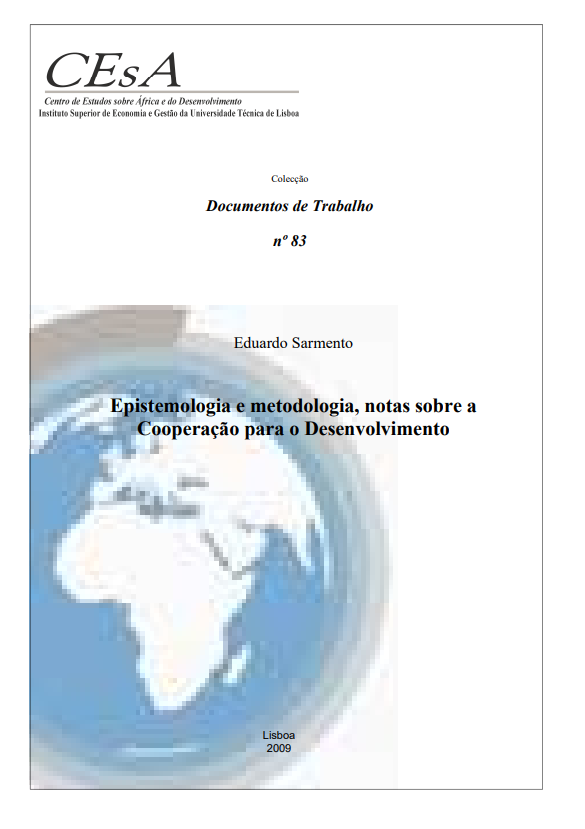
Working Paper 83/2009: Epistemologia e metodologia, notas sobre a cooperação para o desenvolvimento
Abstract:
The discussion about what is meant by epistemology, what is its status and its role as a discipline has been perpetuated as a controversial topic over the years. This situation is not unrelated to the fact that we are dealing with a topic that is likely to take on different perspectives depending on the scientific background of the authors involved, as well as the fact that epistemology constitutes a scientific field that is difficult to define due to its numerous borders with other areas. In Epistemologia e metodologia, notas sobre a cooperação para o desenvolvimento, we had to assume some options and define its scope, as it is not our intention to start an exhaustive discussion about the history of its evolution and the different perspectives, but only to frame the main aspects underlying its characterization, in order to if it is possible to continue for the construction of a theoretical body that allows framing and deepening the proposed analysis theme with the current research project. We can then begin by focusing our attention on the notion of episteme from which the term epistemology comes. Traditionally, according to the Greeks, this term means ‘knowledge’. However, if we briefly look at the historical discussion of epistemology, we quickly see that there are different perspectives, essentially coming from the classical tradition, from Platonic and Aristotelian philosophy. In the first place, it is a question of the existence of a “truth”, that is, the existence of a “truth”, that is, the existence of a “truth”, that is, the existence of a “truth”. In fact, since Plato, knowledge can be characterised as a justified belief that presupposes the answer to the original question of what it is to know.
Quotation:
Sarmento, Eduardo. 2009. “Epistemologia e metodologia, notas sobre a cooperação para o desenvolvimento”. Instituto Superior de Economia e Gestão. CEsA – Documentos de Trabalho nº 83/2009.
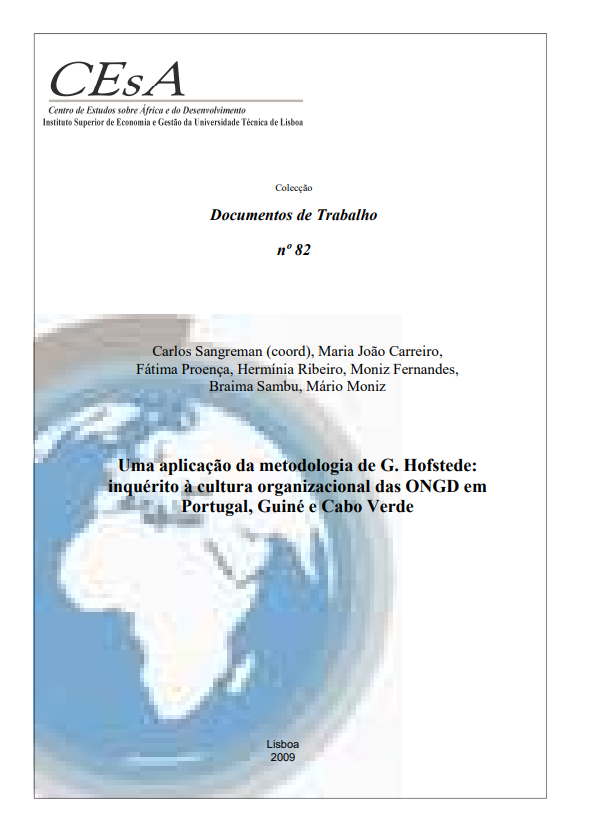
Working Paper 82/2009: Uma aplicação da metodologia de G. Hofstede: inquérito à cultura organizacional das ONGD em Portugal, Guiné e Cabo Verde
Abstract:
PROCODE has as one of its objectives to characterize three of the actors of decentralized cooperation: public higher education establishments – Universities and Polytechnic Institutes -, NGDOs and Municipalities. Uma aplicação da metodologia de G. Hofstede : inquérito à cultura organizacional das ONGD em Portugal, Guiné e Cabo Verde concerns the analysis of data collected by a survey bulletin and by interviews with NGDOs, intervening in Portugal, Cape Verde and Guinea – Bissau, in 2007 and 2008. It seeks to characterize the organizational culture of the NGDOs of these three countries to understand how these actors work in Cooperation, in the logic of the Cooperation Actors Model that the Project has developed. Given that the non-governmental sector has been organized in the three countries with a lot of contact between its members, even beyond the more professional aspects, the expectation of the usefulness of this data clearly goes beyond the Project, being able to constitute a valuable element of management for the Platforms of NGDOs of any of the countries, as well as for a better mutual understanding on the part of the other actors/intervenes in the Cooperation.
Quotation:
Sangreman, Carlos … [et al.]. 2009. “Uma aplicação da metodologia de G. Hofstede : inquérito à cultura organizacional das ONGD em Portugal, Guiné e Cabo Verde”. Instituto Superior de Economia e Gestão. CEsA – Documentos de Trabalho nº 82/2009.
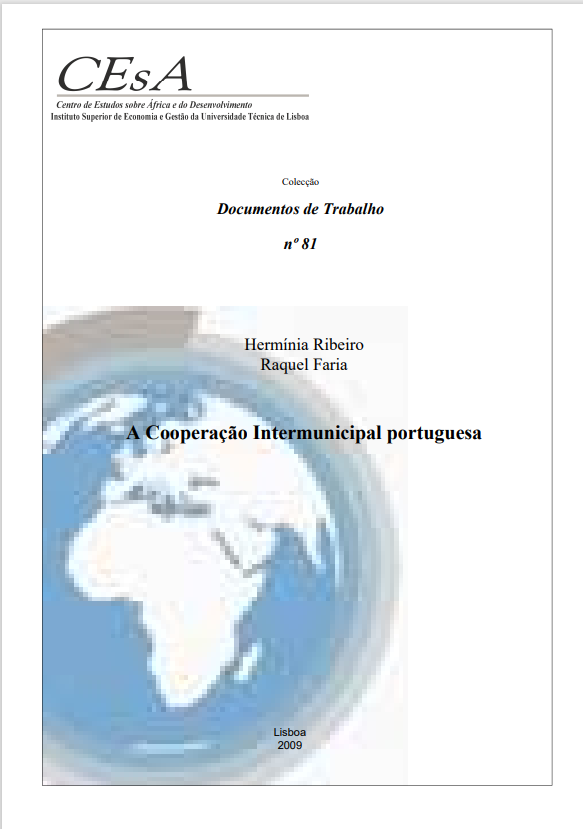
Working Paper 81/2009: A cooperação intermunicipal portuguesa
Abstract:
The decentralized cooperation due to the dimension and importance that it assumes on a scale not only local but also global, contemplates different types of action, strategies, contractual forms… being accompanied by a wide range of factors, among which stands out “(…) the active participation of the various agents in all stages of the process (…)“ (MNE, 2006:40), one of the main agents that assumes the responsibility of ensuring this same participation, are the Municipalities or similar entities depending on the organizational system of each country. It is precisely in this sense that we speak, in A cooperação intermunicipal portuguesa, of Intermunicipal cooperation (CIM), which, very briefly, corresponds to a form of decentralized cooperation in which the municipalities involved assume the role of active participation in development processes (Afonso, 1998). : 25), which can assume different modalities/areas that go through twinnings, protocols, cooperation/collaboration agreements and networks. Having referred to the decentralized cooperation that followed the inter-municipal cooperation as a typology of that, as we have already seen, I consider it to be of paramount importance to mention the following aspect: decentralized cooperation is not limited to an internal scale, but also to a external scale.
Quotation:
Ribeiro, Hermínia e Raquel Faria. 2009. “A cooperação intermunicipal portuguesa”. Instituto Superior de Economia e Gestão. CEsA – Documentos de Trabalho nº 81/2009.





